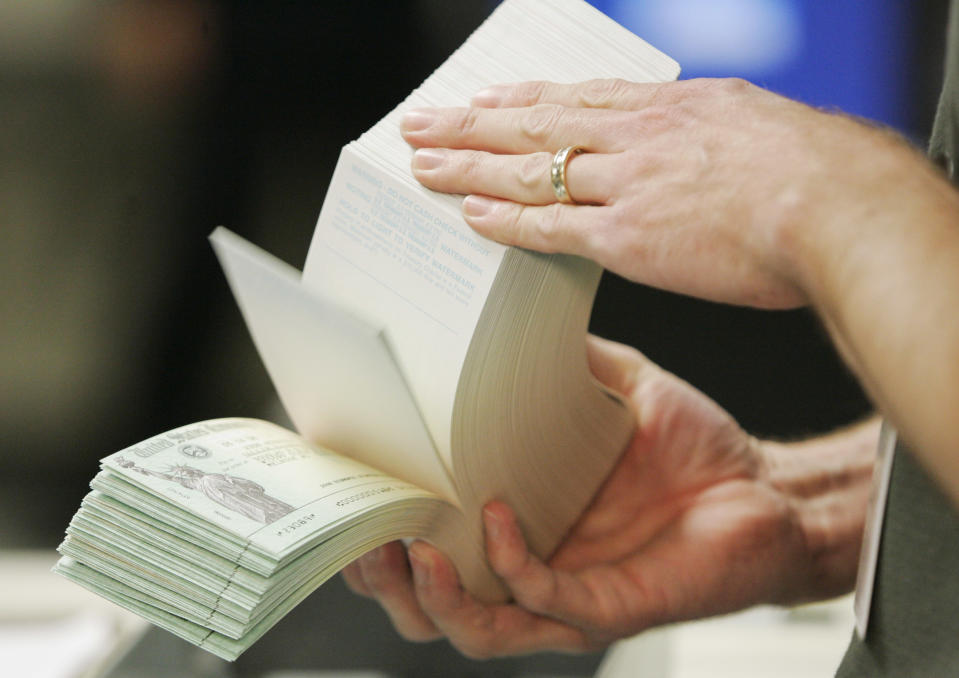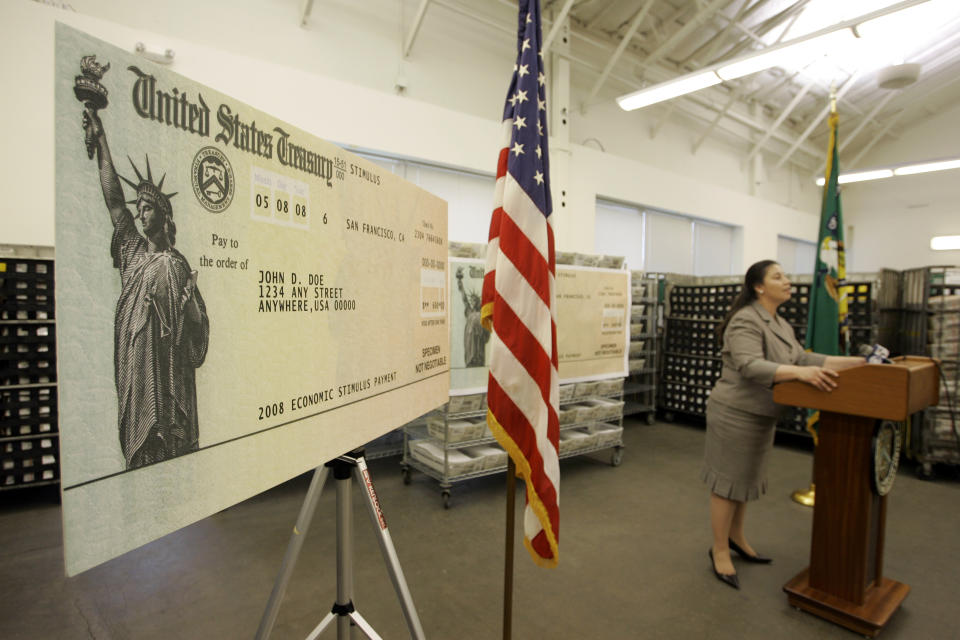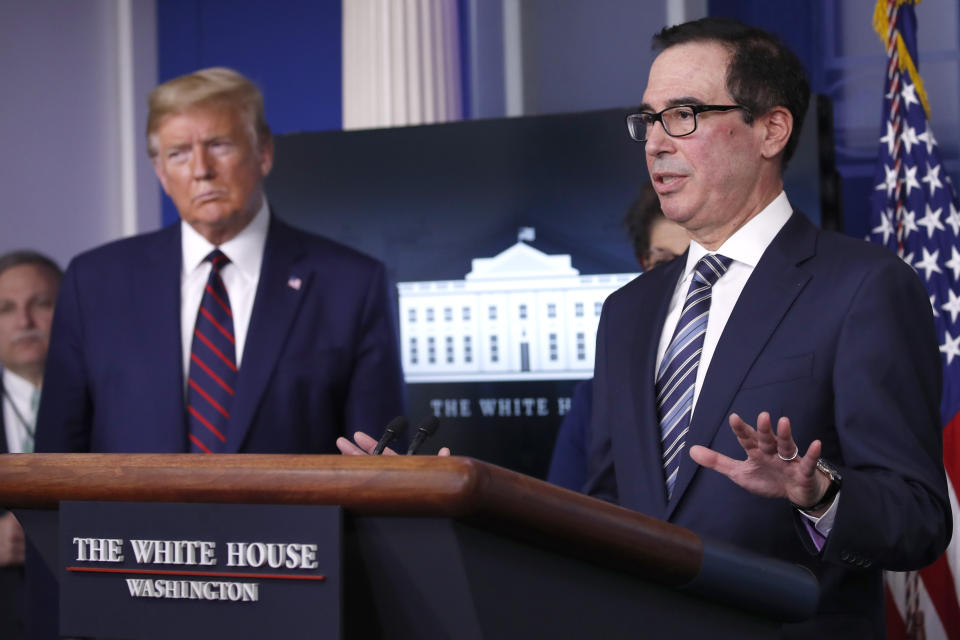Coronavirus stimulus checks: TurboTax launches tool to help Americans who don't file tax returns
TurboTax has launched a new stimulus registration tool in partnership with the Internal Revenue Service to help low-income Americans who don’t usually file taxes get their stimulus aid checks.
The tool is free and allows people to file a minimum tax return with the IRS to determine if they’re eligible for the stimulus payment. If eligible, users will need to answer a few questions and choose whether to get the payment though direct deposit or check.
“There are as many as 10 million Americans who are not required to file a tax return,” TurboTax said in a statement. “Because the IRS will use the federal tax return to determine and send individual stimulus payments, these individuals are at risk of not receiving their stimulus payment.”
Read more: How to file taxes: The full breakdown
Many Americans will get government checks up to $1,200 to help them financially weather job loss, reduced work hours, and other money challenges as the country tries to stem the spread of the coronavirus outbreak.
Social Security recipients and people who are required to file tax returns will not need to provide additional information, but will also have to meet the eligibility criteria to get the payment.
Here’s what else you need to know.

Who gets a stimulus check?
“Our updated estimate is that 93.6 percent of [tax] filers will have a rebate,” said Garrett Watson, senior policy analyst at The Tax Foundation. “And this works out to approximately 140 million households.”
Your eligibility is based on your most recent tax return and your adjusted gross income. If you already filed your 2019 taxes ,your eligibility will be based on that. If not, the Internal Revenue Service will use your 2018 taxes to determine if you qualify.
The benefit is available not only to those who have filed taxes, but also to those who receive Social Security benefits as long as they’ve received their SSA-1099 or RB-1099 forms.
Read more: Tax deadline postponed: Why you should still file as soon as you can
Single adults with income up to $75,000 will get a $1,200 payment. Married couples with income up to $150,000 will get $2,400. Single parents who file as head of household with income up to $112,500 will get the full $1,200 check.
Additionally, Americans who qualify for the stimulus payment and have children will get an additional $500 per child under 17.
Reduced checks will be available for single adults who earn between $75,001 and $99,000 and married couples who earn between $150,001 and $198,000. The check will be reduced by $5 for every $100 over $75,000 for single adults and $150,000 for married couples.
Who doesn't get a check?

Single adults who make more than $99,000 and married couples who earn more than $198,000 won’t receive stimulus checks.
Those without a Social Security number and nonresident aliens — those who aren’t a U.S. citizen or U.S. national and don’t have a green card or have not passed the substantial presence test — aren’t eligible.
You’re also ineligible if your parents claim you as a dependent on their taxes.
How will the government send you the stimulus check?
The IRS will use the direct deposit information you provided from the taxes you’ve filed either for 2019 or for 2018.
If you have no direct deposit information on file or if the account provided is now closed, the IRS will mail you a check, instead.
When will the stimulus check arrive? It depends.
Treasury Secretary Steven Mnuchin said at a White House briefing on Thursday, that those Americans who have signed up for direct deposit will receive their payment within two weeks.
“Social Security, you’ll get it very quickly after that,” Mnuchin said. “If we don’t have your information, you’ll have a simple web portal, you’ll upload it. If we don’t have that, we’ll send you checks in the mail.”
The payments will be deposited directly into your bank account if you received your last tax refund or expect to receive this year’s refund that way.
Otherwise, checks will be mailed, which could take longer to get to Americans. Adding to the complications, about 6% of U.S. adults — or 12 about 12 million Americans — do not have a checking, savings, or other bank account, according to a 2018 Federal Reserve report.

The New York Times, citing IRS guidelines that detail how Americans who aren’t usually required to file tax returns will need to do so to receive payments, noted the guidance “will almost certainly mean longer waits for those who must file new returns to be eligible to receive a stimulus payment.”
Americans with the lowest income will get mailed checks first, according to reporting by the Washington Post. Here’s the timetable for the first checks, per IRS documents seen by the Post:
Taxpayers with income up to $10,000: April 24
Taxpayers with income up to $20,000: May 1
Taxpayers with income up to $40,000: May 15
The rest of the checks will be issued by gradually increasing income increments each week. Households earning $198,000 who file jointly will get their reduced checks on Sept. 4. The last group of checks will be sent on Sept. 11 to those who didn’t have tax information on file and had to apply for checks, according to the Washington Post.
Do you have to pay back the stimulus check?
No. The stimulus payment is actually a refundable credit against your 2020 tax liability, according to Kyle Pomerleau of the American Enterprise, and is paid out as an advanced refund. That means you don’t have to wait to file your 2020 taxes to get the money.
It also doesn’t reduce any refund you would otherwise receive, Watson said.
In fact, if you don’t qualify for the stimulus check now based on your 2018 or 2019 tax returns, you may be able to qualify to take the tax credit next year when you file your 2020 taxes if your income meets the thresholds.
Denitsa is a writer for Yahoo Finance and Cashay, a new personal finance website. Follow her on Twitter @denitsa_tsekova.
Read more:
'Losing $50,000 a day': This company's workers took voluntary pay cuts to prevent layoffs
What to do if you lose your health insurance during the coronavirus outbreak
Read more personal finance information, news, and tips on Cashay
Follow Yahoo Finance on Twitter, Facebook, Instagram, Flipboard, SmartNews, LinkedIn, YouTube, and Reddit.

 money
money 
